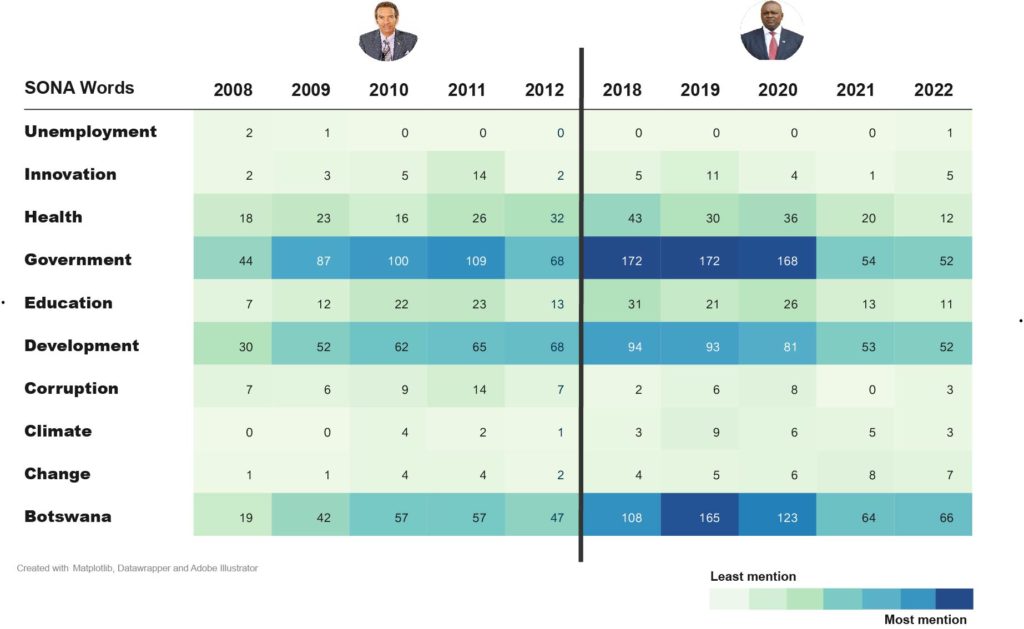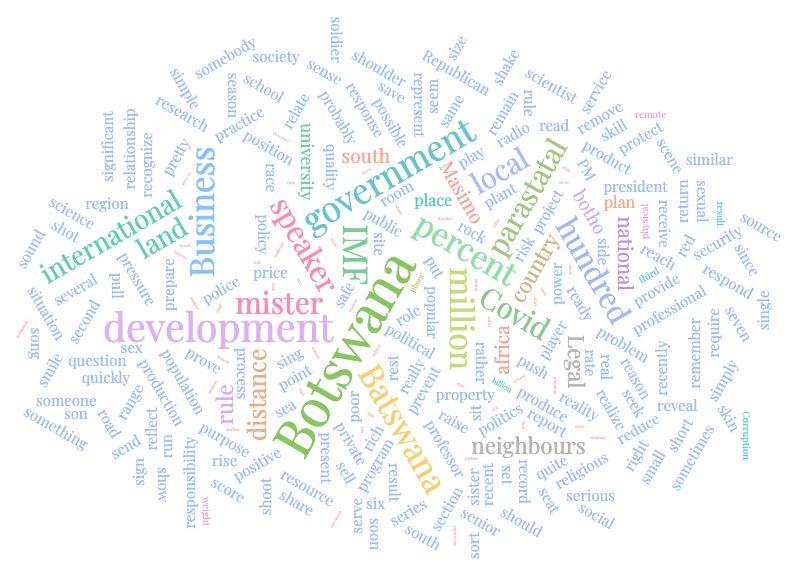
Former Botswana President Ian Khama (Left), Current Botswana President Mokgweetsi Masisi (Right)
State of the usual: What has Masisi and Khama been talking about
1 September 2023A comparative analysis of SONA speeches by presidents, Masisi and Khama give a glimpse of a long-held divergent views.
The State of the nation address (SONA) does two things.
One, it serves as a national score card in which the president puts current events in calm and codifiable context.
Two, the annual event offers a reflection, a run-down of an administration’s successes and goals and an assessment of the path ahead.
A comparative analysis of 10 SONA speeches by President Mokgweetsi Masisi and former President Ian Khama seem to give a glimpse of the priorities they had for the nation. The Business Weekly & Review analysed elements of the two president’s speeches to extract phrases or words frequently used at a given SONA speech in their respective first terms in office. The intention was to transform words into insights by identifying and visualising patterns in the speeches to find the main messages as well as to find key differences and similarities.
Our analysis shows that president Khama typically delivered longer speeches with an average length of 14200 words (versus Masisi’s average length of 10800 words).

The longest state of the nation address was delivered by president Khama in 2011. It was more than 18 000 words. It’s tone consistent with his obsession with his military discipline. The shortest was just over 7400 words delivered by President Masisi some seven months after succeeding Khama. From the onset, Masisi had significant hardening of thoughts – betraying long held suspicions that he was going to become Khama’s lapdog. During his inaugural SONA speech in 2018, Masisi used the word ‘democracy’ three times more than his predecessor did in his inaugural SONA address a decade earlier.
SONA is generally an opportunity for familiar rhetoric and posturing by the party in government. Khama and Masisi lack of Obamasque charism, eloquence and PR skill set is not surprising. Both Khama and Masisi were charity picks. The ruling BDP is not known for rewarding merit when it comes to appointing its leaders.
A dissection of Khama speech patterns suggests the unusual way he speaks has its roots in oral culture. He rallies his audience through impassioned targeted conversation, even if this is one sided and usually doesn’t follow a clear narrative arc.
Masisi on the other hand uses language to create a brand for himself.
His 2020 SONA speech had a certain modernist impetus to it, leveraging a feeling of strength, a sense of determination and an impression that he gets things done. He doesn’t.
But majority of the speeches lacked the conceptual anchor for practical reasoning, a factor that explains poor project implementation.
After removing common words, such as ‘a’, ‘the’, ‘in’, etc., ‘Government’, unsurprisingly emerges as the most popular topic, in terms of mentions per 1000 words across speeches. Masisi refers to ‘government’ slightly more often than Khama (21/1000 words compared with Khama’s 14/1000 words).
While development should have been Khama’s defining mantra, it is Masisi who mentioned development-related terms far more frequently than Khama during his first term in office. Among word-pairs, Masisi’s top ones were ‘Botswana’, ‘Government’ and ‘development’. Khama’s most popular word-pairs include ‘us’, ‘public’ and ‘Botswana’— suggesting a storytelling approach to his speeches.
Khama spoke more about the economy, reflecting the challenges he might have faced during the 2008 credit crunch. Masisi has spoken more about education and health, reflecting his training as a teacher. Words such as corruption, climate change, poverty were conspicuously absent in both presidents’ first-term speeches.

So much ado about innovation
On the campaign trail in 2019, Masisi promised improved education to prepare youths better to enter the labour market, a reduction in business bureaucracy and the digitisation of the economy. However, if the past SONAs are a guide, Masisi has not moved past the familiar rhetoric and posturing.
Both Khama and Masisi have not paid much attention to innovation – in words and in deeds. Every November when they took to the podium to deliver the State of the Nation Address in Parliament, our speech analysis shows that they hardly mentioned the word innovation. In the first five years in office, the two mentioned the word 52 times. This is not to say that the country has not innovated completely. In 2021 the Global Innovation Index among 16 African countries that improved their global innovation position.
However, a key difference between the two presidents is the use of the first-person reference: Khama has referred to himself more times than any collective word (we, our, us). Masisi on the other hand used ‘our’ and ‘we’ more times than ‘I’.
How about corruption and unemployment?
Botswana is in the grip of a deep economic malaise. While it is not new, it is only that it has reached a breaking point. The number of unemployed graduates is at peak, job creation remains a pressing issue for most politicians. This explains why politicians in government are fudging the topic during the state of the nation address. Based on the word count, President Masisi used the word ‘unemployment’ once in his SONA speeches
between 2018 and 2022.
While this is not to suggest that the president has not been trying to fight unemployment, but the omission is telling.
On the same issue, Khama did not do much better. In an 8000-word SONA speech in 2008, Khama mentioned the word unemployment twice; first acknowledging a mismatch between graduates’ skills and workplace demands and claiming that government will henceforth commit to the reduction of unemployment. The word appeared once in his 2009 speech.
One in every three youth is said to be unemployed in Botswana.
One would have expected Masisi to move decisively to rebuild institutions of democracy which were all but destroyed during the Khama era but are now under new leadership. The worst affected were the intelligence services, the corruption watchdog, and the tax collector. Freedom House says contracts are still awarded through patronage networks and budget processes remain opaque.
Like Khama, Masisi continues to use threats and lawfare to harass opponents and journalists are not free according to the Democracy Research Project.
So, it is not surprising that the word ‘corruption’ has not been receiving much mention during the SONA speeches. Khama mentioned it only 43 times in the first five years in office. Masisi mentioned it 19 times when delivering SONA between 2018 and 2022.
Methodology
Reporting on this story relied on the past State of the Nation Address speeches delivered by Presidents Masisi and Khama. However, we focused on their first terms to give it a fair comparative representation. To determine word count, we downloaded 10 PDF speeches 2008 – 2012 and 2018 – 2022 and turned them into text document and fed them into Pandas, a python library.
To find the frequently used words, we used Natural Language Toolkit, a platform used for building Python programs that work with human language data for applying in statistical natural language processing (NLP). In data visualization, we used Datawrapper and Adobe Illustrator.



Join the Conversation